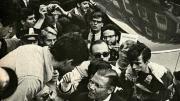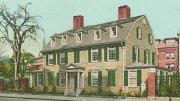Amid this year’s presidential political perturbations, Primus recalls that 50 years ago this November, U.S. defense secretary Robert McNamara, M.B.A. ’39, returned to campus for a seminar. As former Harvard Magazine editor John Bethell recounts in Harvard Observed, the visit coincided with a turn toward “militant action” by Students for a Democratic Society, which had demanded that McNamara participate in a debate. He declined.
“Some 300 demonstrators were there to confront McNamara as he left Quincy House,” Bethell narrates. “Discovering that he was being shown out the back way, some of the demonstrators lay down in front of a waiting police car. Others started to rock it. By then a crowd of almost a thousand had assembled. McNamara climbed onto the roof of a parked car and tried to take questions, but he was drowned out by shouting. “I spent four of the happiest years of my life on the Berkeley campus doing some of the things you’re doing here,” McNamara shouted back. “I was tougher then, and I’m tougher now!” Jumping down, he was escorted by Harvard police into nearby Leverett House, and then through University steam tunnels to the safe haven of Harvard Law School.”
Some 2,700 students signed a resolution apologizing for the “unruly behavior,” and College dean John U. Monro decried “mob rule.” But he declined to make “any kind of political activity or demonstration a matter of disciplinary action” and the full faculty imposed no punishments—but warned against further “obstruction of free movement.”
Given all that followed, the disruption would come to seem almost insignificant.
Michael shinagel, former dean of continuing education (1975-2013) and master of Quincy House (1985-2001), has self-published a memoir, Holocaust Survivor to Harvard Dean. A literary scholar long embedded in the community, he is an ideal critic of local norms. Thus:
“The president of Harvard, Derek Bok, had a telling phrase for the arrogance that one encountered from time to time….He referred to ‘the Cambridge conceit’ as a shorthand for attitudes of superiority… I remember [lunching] at the Harvard Faculty Club with the dean of the Graduate School of Arts and Sciences,…J. Peterson Elder. As…a Phi Beta Kappa graduate…, I asked [him], out of curiosity, what percentage of his students…were Phi Beta Kappa. He looked at me quizzically and responded, ‘Why, I assume they all are.’…
“In fact, the Cambridge conceit manifested itself early. When my son Mark was enrolled in a preschool program at the Buckingham Browne and Nichols School…I would walk him to school in the morning….One day, as we entered the schoolyard, two little boys were engaged in a shouting match that was intensifying until finally one of the boys delivered his coup de grâce: ‘My father has tenure at Harvard and yours doesn’t!’ ”
Pumpiana. Peter Crane ’68 writes: “In the fall of 1964, those of us…in Hollis Hall…would sometimes hear the loud ‘Gunk, gunk, gunk’ of passersby satisfying themselves that the pump in front of the building could still draw water. If memory serves, it was often out of action owing to thievery [of the handle].
“The year before, Bob Dylan had played Club 47 on Palmer Street, perhaps 500 feet away, across the Square. In January 1965, he recorded ‘Subterranean Homesick Blues,’ which ended with the baffling line, ‘The pump don’t work /’Cause the vandals took the handles.’ Maybe it isn’t so baffling after all. Does anyone know for sure?”
Primus consulted Lane professor of the classics Richard F. Thomas, a Virgil scholar who co-edited The Performance Artistry of Bob Dylan, about whom he teaches a freshman seminar. He observes: “That song’s lyrics mostly come out of the fertile and surreal mind of Dylan. He certainly was around Harvard in the early 1960s, even in Harvard Yard, if we believe what he says on an outtake of ‘Baby, Let Me Follow You Down’ (1961; the outtake version is on Biograph, disc 1, 1985): ‘first heard this from Rick (Eric) Von Schmidt. He lives in Cambridge. I met him one day in the green pastures of Harvard University.’ I wouldn’t stake too much on it myself but why not? We’ll never know since Dylan doesn’t talk about his lyrics.”
Anyone else?









